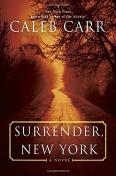
by Caleb Carr
Hardcover- $13.04
Caleb Carr, bestselling author of The Alienist and The Angel of Darkness, has created a contemporary psychological thriller haunted by ...
Overall rating:
How would you rate this book?
Member ratings
Surrender, New York, Caleb Carr, author; Tom Taylorson, narrator
Two forensic scientists, Dr. Trajan Jones and Dr. Michael Li, were essentially ousted from their jobs in New York City because of their methods of investigation, and because they exposed the corruption and incompetence existing within law enforcement.
They resettled and set up shop in upstate New York in a town called Surrender on the property of Trajan’s eccentric Aunt Clarissa. She was not known to have a great love for the people in law enforcement, so she welcomed them and prepared a space for them to live and work. Trajan rescued a cheetah, Marcianna, from death when it was diagnosed with Feline Leukemia, his aunt gave him a piece of property to set up and use as her den. She is well-loved, perhaps excessively, and well cared for by Trajan. Both Jones and Li worked out of a converted vintage airplane which they fitted out with whatever equipment they needed. From that plane, they taught an online, college course in criminology. They are an unusual pair of partners who banter back and forth, sometimes with ridiculously immature comments. In addition, the language is often unnecessarily coarse. They seem quite immature for adults who are educated professionals.
When the two were quietly asked to clandestinely participate in an investigation of a stream of suicides, they accepted, but encountered resistance from the state police force since their reputation preceded their arrival in Surrender. Police officers resented them for their past work history. Their participation, though, turned out to be critical and a major contribution to the solving of the mysterious number of suicides of young high school age students, students who were abandoned by their families.
When a young high school student, Lucas trespassed on their property with his friend Derrick, the doctors discovered that Lucas held many clues to the suicide investigation. He actually knew them, or of them. The scientists, perhaps against their better judgment, enlisted his help in their investigation; both boys, Lucas and Derrick, were wards of Lucas’s 20 year-old, blind sister, Amber. Both had been abandoned by their parents. Lucas, who was already studying forensic science at school jumped at the opportunity to help, Derrick opted out. He was often referred to as developmentally challenged. During the ensuing days of the investigation, they created a team of investigators, also enlisting the help of Aunt Clarissa, Amber and a group of their students, to provide them with alternate insights into the mystery of these throw away children who are doing away with themselves.
As the story progressed it twisted and turned, planting different suspicions in the mind of the reader and creating ancillary themes which seemed to distract and unnecessarily complicate the story. Often extraneous details were introduced that added nothing but length. When a romance blossomed between Lucas’s sister and Trajan, although he was almost twice her age, I found I had to skip over the scenes, they were so inappropriate.
There are many distractions. There is a cheetah that takes on the role of an important character, a one legged investigator who doesn’t seem to have as much trouble getting around as he should considering the amount of pain he often experiences from a disease which might be advancing, a retarded child who has occasional moments of lucidity beyond his scope, a precocious child who wants to be treated as an adult and often acts like one, a guardian who acts like a harlot, a sniper who is hidden in the woods shooting at unsuspecting characters; there are missed obvious opportunities to discover clues, some events that seem overly contrived, as when Mike’s girlfriend, a New York detective is run off the road under suspicious circumstances and doesn’t turn up for so long that one wonders why she was introduced in the first place, or when Trajan and Amber are smooching in a closet while law enforcement and media surround the house because Derrick has disappeared. It was totally out of the realm of reality. The author took every opportunity to mock the system of law enforcement and inserted social themes like immigration, parental neglect, environmental protection, media corruption, racism, economic disparity and even homosexuality, seemingly just for the purpose of inclusion.
This is not Caleb Carr’s finest hour. The dialogue is hackneyed, infantile, crude, and often feels condescending to the reader. The characters seem like children in adult’s clothing, and the children occasionally seemed more mature than the adults, and were capable of making more common sense assumptions and judgments.
There was a lot of misdirection and the ending was a surprise of sorts, but the route from beginning to end was too convoluted and too long; the plot slowly became less credible. However, there were so many interesting asides that introduced many little known facts, that I believe, absent the crude language, foolish sex scenes, excessive details and the circuitous route to the conclusion of this diabolical plan to rid the area of throw-away children, that the book might have been much more satisfying as the pair exposed the corruption at the very top, unmasked the villains, and solved the case.
Book Club HQ to over 90,000+ book clubs and ready to welcome yours.
Get free weekly updates on top club picks, book giveaways, author events and more








